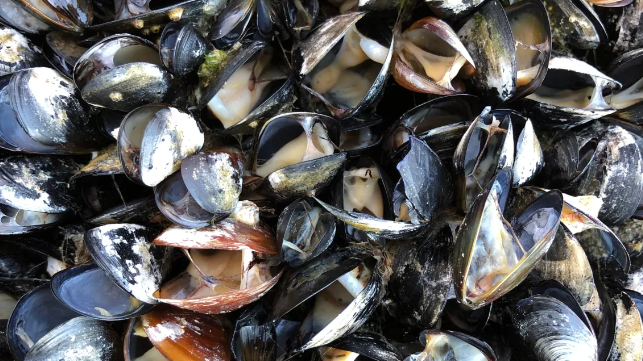Extreme Heat Wave Cooks Mussels Alive on Salish Sea Shorelines

Last month's extreme heat wave in British Columbia created a massive clam bake in the intertidal zone, killing about one billion mussels, snails, sea stars and clams in the Salish Sea region, according to a marine biologist from the University of British Columbia.
"During the heat wave, it just got so hot that the mussels, there was nothing they could do," marine biologist and intertidal zone specialist Prof. Chris Harley told CBC. "A mussel on the shore in some ways is like a toddler left in a car on a hot day. They are stuck there until the parent comes back or, in this case, the tide comes back in."
As the heat wave spiked along the coast near Vancouver, Harley documented surface temperatures in excess of 120 degrees Fahrenheit on the shoreline. That is far beyond the maximum that mussels can survive for an extended period, and Harley reported large, foul-smelling stretches of dead molluscs along Kitsilano Beach and other sites near Vancouver. Extrapolating from the fatality rate and the prevalence of marine life in the Salish Sea region, Harley put the death count in the range of ten digits.
"If you're losing a few hundred or a few thousand mussels for every major shoreline, that quickly scales up to a very, very large number," he told CBC.
Commenting on the impact, marine biologist Jennifer Sunday of McGill University suggested that the mussel beds will repopulate, but "there will be a lag and maybe a lasting genetic effect." Until that repopulation occurs, there will also be less food for mussel predators like sea stars. Water quality will also be temporarily affected, as mussels are filter feeders and clean out solid matter from seawater.
Vancouver is baking in a 35+ deg heatwave. I checked out the ripe stench coming off the beach today. It was the multitude of sea life - mussels, crabs, seaweed - killed by the heat and now rotting. Our temperate intertidal has never experienced such high temperatures. #BCHeat pic.twitter.com/kJu2ZWxkYC
— Jonathan Page (@trichomics) June 28, 2021
According to climate scientists at World Weather Attribution, a consortium that attempts to use computer modeling to determine whether carbon-driven warming contributed to specific weather events, the heat wave in the Pacific Northwest would have been "virtually impossible without the influence of human-caused climate change."
The heat wave broke records throughout the region; the town of Lytton, B.C. briefly set a nationwide temperature record, posting an unprecedented 121 degrees Fahrenheit shortly before its destruction by fire. About 200 heat-related fatalities were recorded in Washington and Oregon, along with about 720 more in British Columbia.
